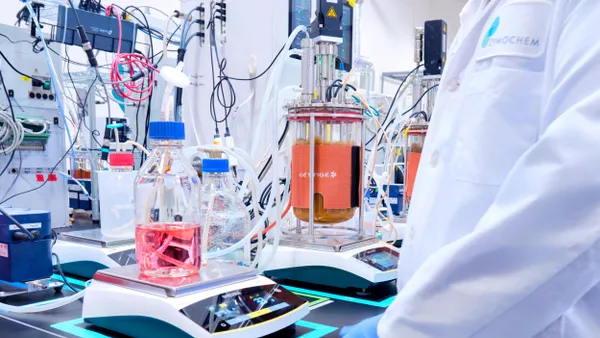Dive Brief:
- Denim giant Levi Strauss & Co. is committing to achieve net-zero emissions across its supply chain by 2050, the company said in its first climate transition plan unveiled last week.
- The apparel manufacturer also set a few near-term sustainability targets, including a goal to reduce absolute scope 1 and scope 2 greenhouse gas emissions by 90% by 2025, compared to a 2016 baseline, as well as a goal to cut absolute scope 3 emissions by 42% by 2030, compared to a 2022 baseline.
- Levi’s joins other major denim producers such as Diesel and Gap that have also committed to net-zero emissions by mid-century. Levi’s main competitor, Wrangler and Lee, does not have a 2050 goal but has made recent efforts to create more eco-friendly denim.
Dive Insight:
As part of the plan, Levi’s also pledged to rely on 100% renewable electricity across all its company-operated facilities by 2025, and reduce its freshwater use during the manufacturing process in regions with high water stress by 50% by next year, compared to a 2018 baseline.
The company said its climate transition plan is aligned with the Task Force on Climate-Related Financial Disclosure’s framework and backed by reporting guidance from the Carbon Disclosure Project and the We Mean Business Coalition. Levi’s additionally sought out feedback from “trusted advisors” and other leading research institutions, non-government organizations, investors and brands, including input from environmental nonprofits Ceres and the World Resources Institute.
“Our climate transition plan embodies our commitment to doing our part, reaching our targets, and working with partners across our value chain to enable collective action to address climate change,” Jeffrey Hogue, the company’s chief sustainability officer, said in the Oct. 16 update. “These steps will not only move us toward our net zero climate ambition by 2050, but also strengthen our own business’s resilience to the effects of climate change.”
The apparel company — whose portfolio also houses brands such as Dockers and Beyond Yoga — said it intends to revise its climate transition plan at least every three years to “maintain an accurate focus on climate risks and opportunities and to ensure alignment with prevailing and internationally accepted frameworks.”
The inaugural plan comes shortly after Levi’s announced the Science Based Targets initiative had approved its 2050 net-zero goal in May. At the time, the company also said it was updating its baseline year for scope 3 emission reductions from 2016 to 2022.












